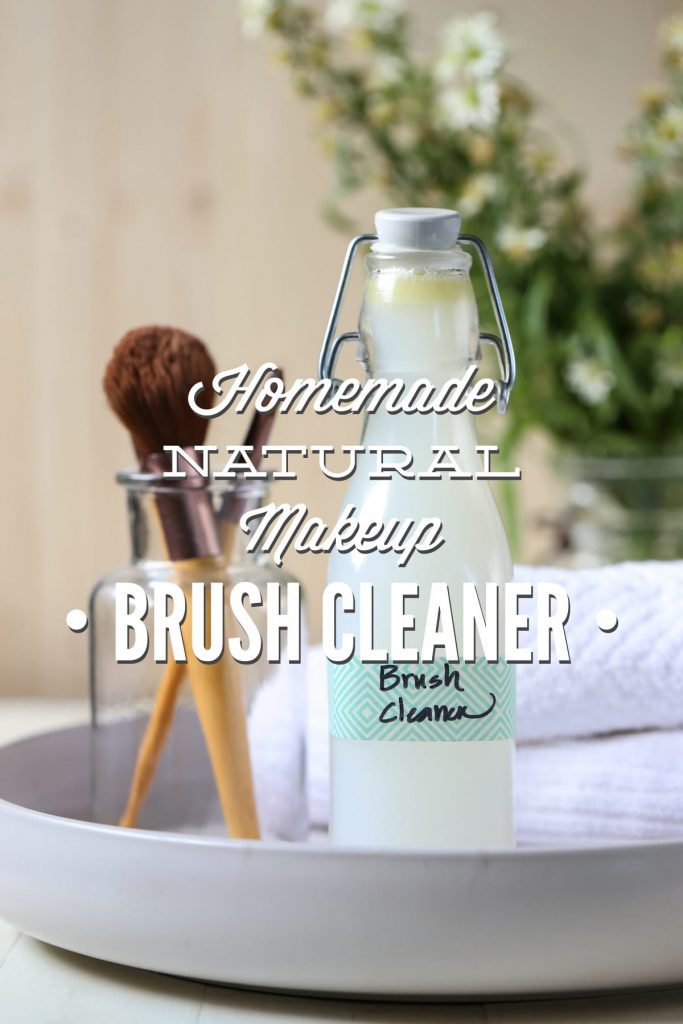
Want to Save This Article?
Enter your email & I’ll send it straight to your inbox. And you’ll get new recipes & tips each week.
Confession: I’ve been making a big beauty mistake and didn’t even know it.
Last month, while visiting one of my favorite natural shops (essential oils, herbs, organic makeup–it’s a “crunchy mama” utopia) I overheard the herbalist on duty talking to a fellow customer about breakouts–the little unwanted guests that randomly pop-up on the face. The conversation instantly caught my attention. I quickly and very politely jumped in, “I’m not sure why my skin still breaks out at the most random moments. My diet is super clean, I drink a ton of water and make my own homemade products. Any tips?” The herbalist looked at me and asked a simple, yet skin-changing question, “Do you clean your makeup brushes?”
Lightbulb moment!
I’m embarrassed to admit that I’d never thought about cleaning my makeup brushes. Big mistake. As it turns out, cleaning makeup brushes is a pretty important task that can prevent bacteria from spreading on the skin.
Bacteria = breakouts.
Breakouts = makeup brush contamination.
Makeup brush contamination = more breakouts.
It’s a nasty cycle.
My search for the ultimate brush cleaner began.
There are a number of store-bought brush cleaner options, and there are also a number of DIY tutorials on Pinterest. Most of the ingredients used in both the store-bought and “homemade” versions are far from natural, in my opinion. I decided to create my own homemade brush cleaner. Take that Pinterest– PS: I still love you! With a few basic ingredients, which I already had on hand for DIY beauty products, I was able to easily whip up a natural solution.
The moment of truth came as I dipped my foundation powder brush into the solution. You guys, the resulting liquid was disgusting–oil, dirt, months worth of makeup! To say that I’m now a brush cleaning advocate is an understatement. Trust me, just try it once–dip your makeup brush in a few simple ingredients–your beauty routine will forever be changed.
From what I’ve read, most makeup professionals recommend cleaning brushes daily, particularly the ones used for foundation and blush. Daily feels a bit overwhelming and far from “simple,” so I’m practicing a twice a week system. Baby steps! Some cleaning at this point is much better than no cleaning at all. I’m now going on four weeks of this routine. My makeup brushes are incredibly soft and my skin feels clean. Bottom line: Do it! Clean your brushes. ASAP.
My homemade brush cleaner recipe works for any cleaning schedule since it makes enough solution for soaking sessions (my preferred method of cleaning) or daily spraying. Whichever method you choose, go with something that’s doable for you.
Happy Cleaning!
I recently added to this post with a tutorial on how to clean makeup brushes with this DIY recipe. Check out the updated post here.
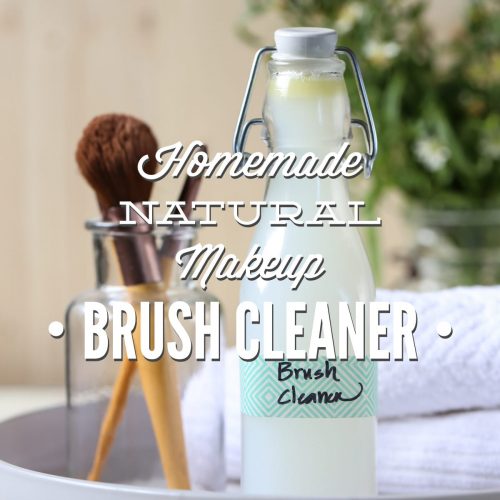
Homemade Natural Makeup Brush Cleaner
Ingredients
- 1/2 cup witch hazel
- 2 tsp baby mild castile soap
- 1 tsp skin-nourishing oil like almond or olive oil, optional
- 1 cup distilled water
Instructions
- In a bottle or mason jar, combine all the ingredients in the order listed (the recipe). Shake the bottle. This solution may be used multiple times to clean brushes. Store the mixture in the fridge.
- Combine as much of the mixture needed in a bowl. Add your makeup brushes to the mixture. I like to swish the brushes back in forth in the mixture and then let them soak for a few minutes. The mixture will go from clear to a dirty makeup mixture quickly. After a few minutes, remove the brushes, dump the solution, and rinse the brushes under the water.
- Let the brushes rest on a towel to dry. Repeat weekly or twice a month to keep your brushes clean.
Video
Notes
1/2 tsp baby mild castile soap
1/4 cup distilled water
(optional) 1/4 tsp carrier oil, like grapeseed or olive oil
When you introduce water into a product without a preservative you always run the risk of introducing bacteria, so use water-based products quickly.

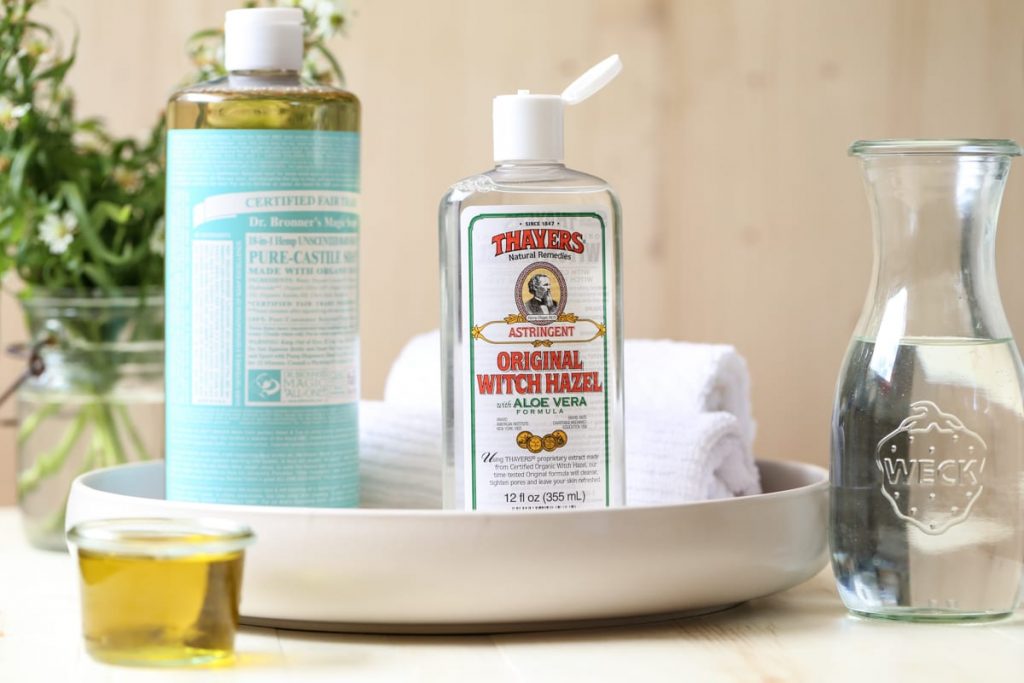
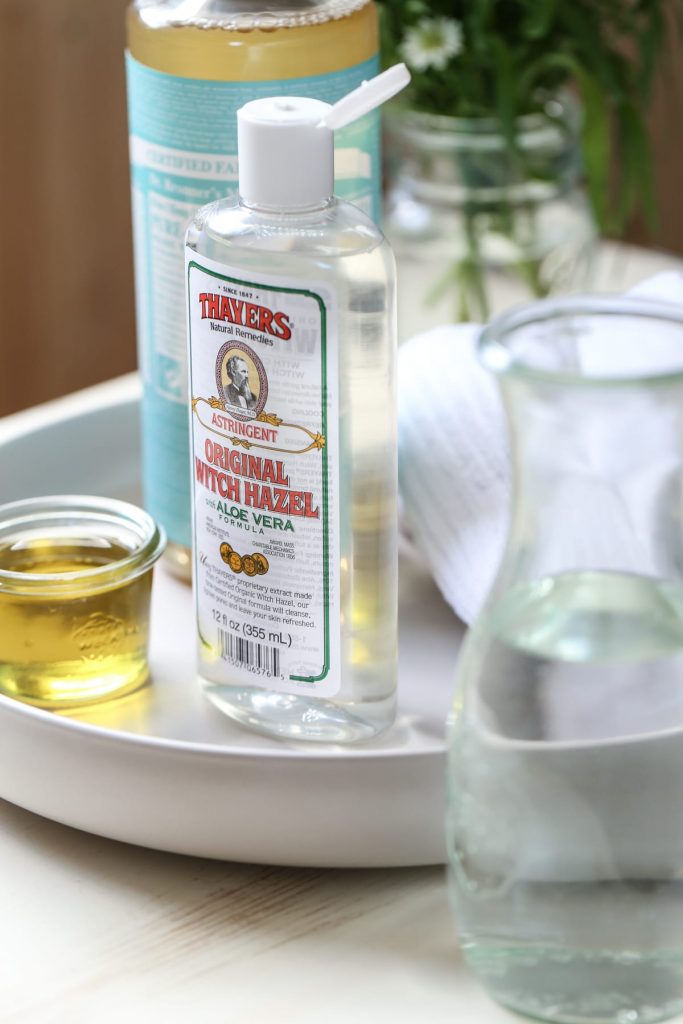

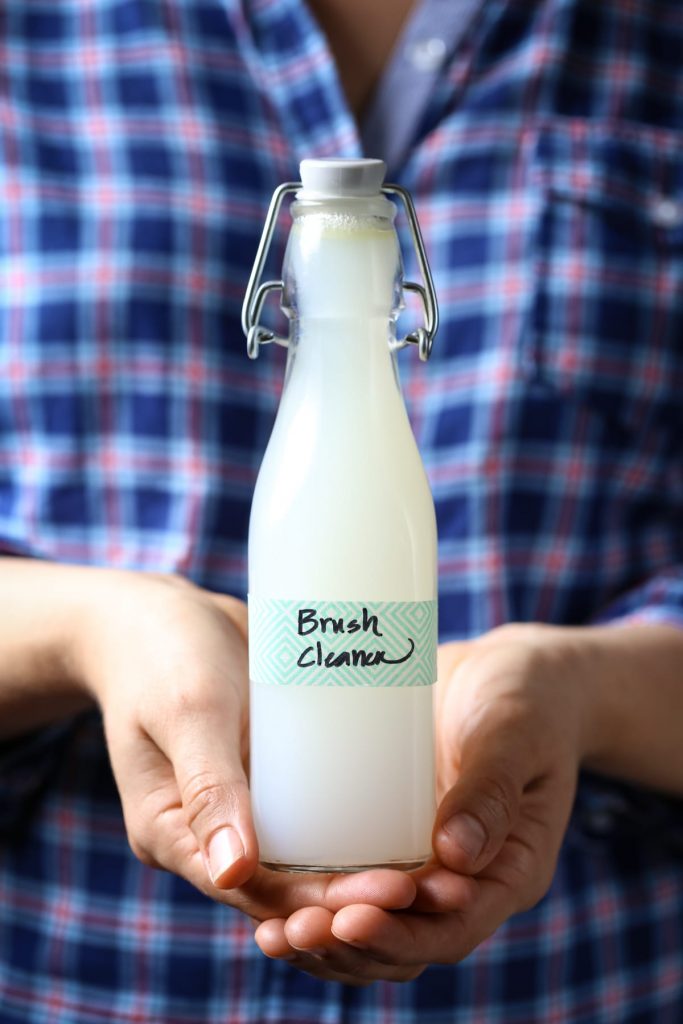
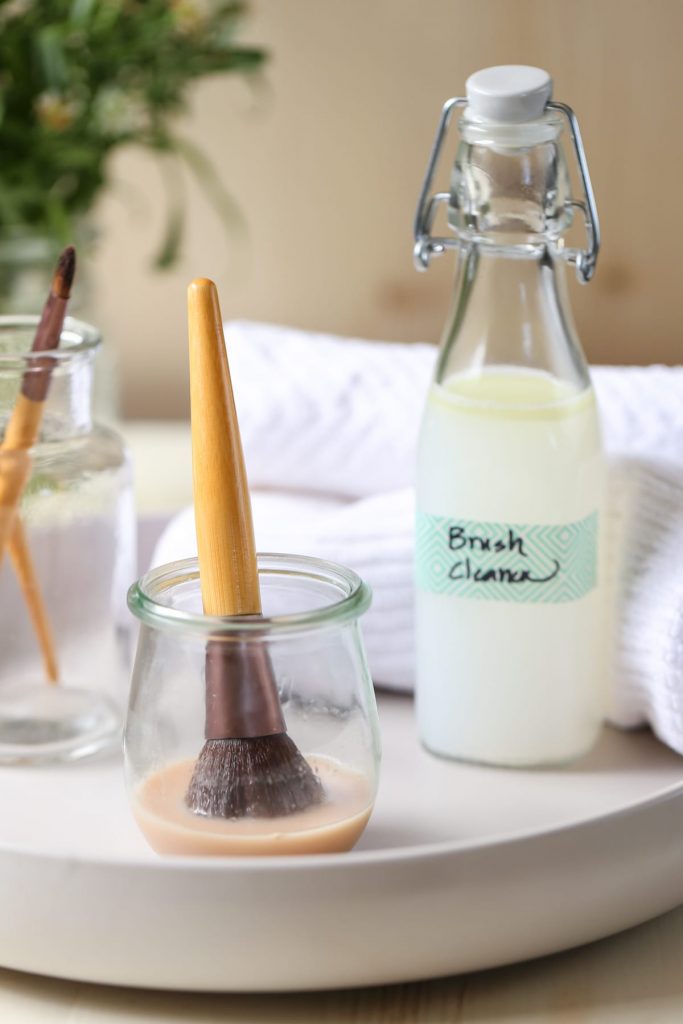
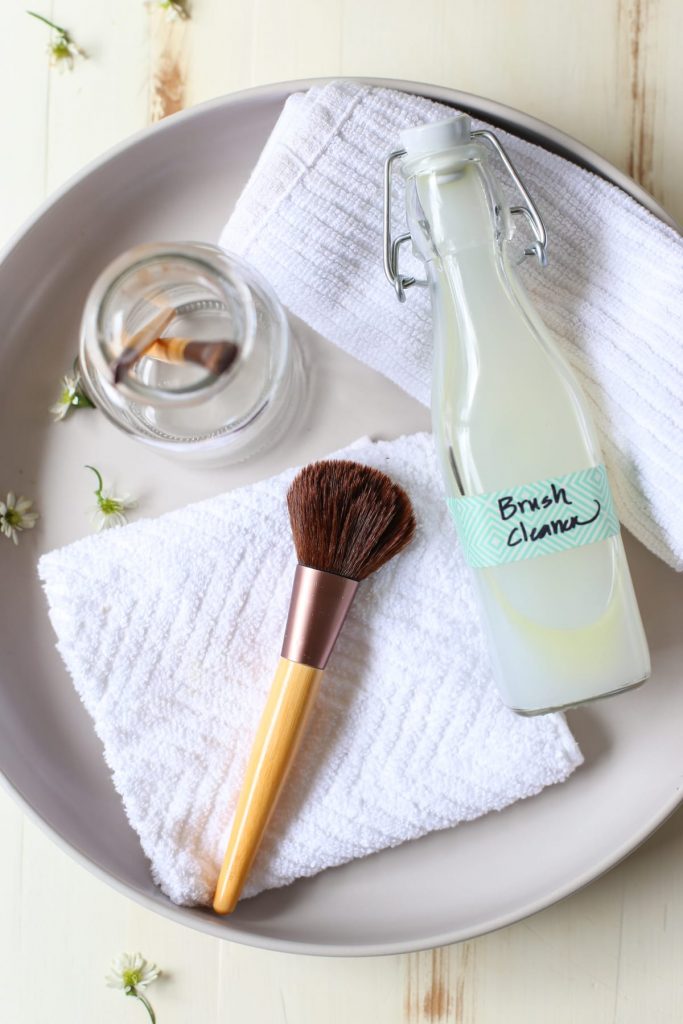
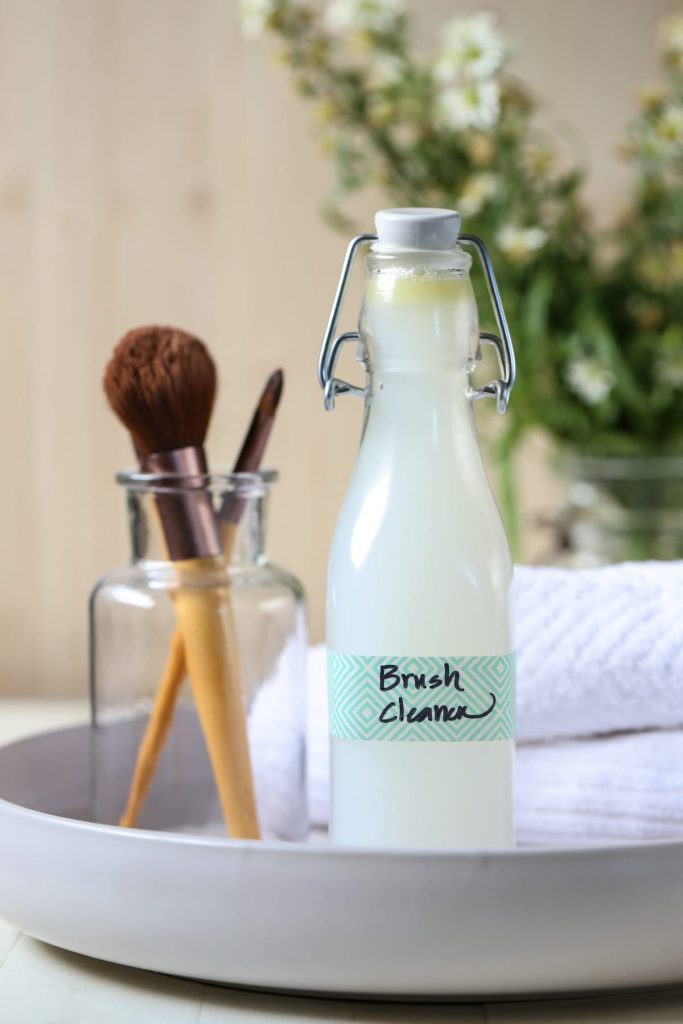
Yet another genius way to use witch hazel and distilled water. I’ve used both of these items for a summer cooling spray (mostly for my son during really hot baseball practice days) in the past, and it worked great!
Hey Kate, Witch hazel is definitely an amazing ingredient.Enjoy!
Thanks for sharing such an awesome article. It really helped me a lot. Once again thank you
I feel pretty stupid…I put in jojoba essential oil….that is NOT what you meant right? Because now my brushes are super oily, so i had to wash them all out with shampoo.
Hey Susan, You’ll want use a regular oil versus an essential oil, or you can skip the oil. I find that castile soap can be a bit drying, that’s why I add the oil. I’m sorry your brushes were super oily.
No worries, I think I got most of the oil out! lol
Just we’re on the same page, reg oil- meaning I can use cooking avocado or coconut oil, right?
Yep, Susan :). Same oil you would use to cook with. Coconut oil can be a bit more on the oily side, so you may want to reduce the amount to just a dash or two.
Hi there – just wondering with the oil and witch hazel do you need a preservative as it is an oil and a liquid mixed together? Thanks
Hey Sarah, This solution is used quickly, it’s not intended to sit around for months, so you shouldn’t need one. If you plan to make a large batch and keep it for a while, then you’ll need to add a preservative. You can also reduce this recipe in half to create a smaller batch, if you won’t use the entire recipe in a short amount of time.
Update! Since I started making my own brush cleaner using your recipe, there have been a few changes on the castile soap. First, I used rose scented castile soap, and then I wanted to buy baby unscented one like your original ingredients. I couldn’t fine it in a small bottle, so I experimented with unscented baby shampoo (there are many brands out there). But with the baby shampoo, I wasn’t satisfied with the results because I had to use more cleaner to clean my brushes, but my brushes didn’t feel clean. After just one or two uses from one batch, I didn’t want to continue to use it. Finally, I bought baby unscented castile soap in a small bottle, and the results are awesome. Now I know why your original recipe used baby unscented one. I will stick with your recipe forever. Thank you so much for sharing this awesome idea.
Oh my! So glad I tried this because by brushes were DISGUSTING! I had to make two batches to get them clean! I will be making this more of a priority now. Thanks so much for the post! I love your blog and have an addiction now to diy natural products. I’ve made your powdered foundation, laundry soap, face cleansing reusable wipes, and countless other cleaning products…. I have found that your recipes work the best out of any others I find on Pinterest (sorry others, she’s got got it down!).
Hey Katie, I’m so glad you’re enjoying the recipes! It brings me so much joy to hear that you’re experiencing good success with the recipes shared here on the blog (that’s my number one goal when sharing my recipes :)). Cleaning makeup brushes is such a disgusting (in a good way since they’re now clean, lol) and eye-opening experience ;).
What a great and useful idea! I will make this today. I may add a couple drops tea tree oil as it is also a great disinfectant.
Great idea, Joyce!
I agree about the brushes staying oily. Since I do oil cleansing and use diy sunscreen/lotion, the brushes seem to get oily/sticky which is why I made the cleanser – my branch basics or diy castille hand soap was not cutting it when washing the brushes. I just made my brush cleaner two days ago, so we’ll see how the oiliness goes. I am thinking I may have to omit the oil in the cleaner – any thoughts on that?
Also, can you reuse the liquid if you dip them in a jar of the cleaner to soak? Otherwise, it seems like a lot of wasted product which we all hate! ;0) Thanks for the great ideas!
Hey Debbie, You could omit the oil. I recommend using a very small amount of the cleaner at a time, and pouring the cleaner into a small bowl before soaking the brushes versus dipping the brushes into the main jar. The cleaner should make multiple batches this way.
Does it have to be baby mild castile soap? I couldn’t find baby mild only baby unscented.
Hey Perla, Baby unscented will work great!
Thank you so much! I tried it & works perfectly!
I made this cleaner a couple of months ago for the first time, and one recipe lasted me for 4 washes of my brushes that are a powder brush, blush brush, and three eyeshadow brushes. This cleaner works perfectly to clean up my dirty brushes. I like it a lot because it doesn’t leave any residue due to the castile soap (I use rose scented one), and after drying them up, the brushes feel as fresh as usual. I just made another batch that I’m going to use tomorrow. Thank you so much for this wonderful brush cleaner.
Hey Soomin, It’s great to hear you’re enjoying the cleaner! Happy brush cleaning ;)!
This worked great on my makeup brushes! Thank you for posting this recipe 🙂
I used fractionated coconut oil since that is what I had on hand for my other home made beauty stuff, and it worked great for me. (no oily residue). I did rinse the brushes very well after cleaning.
Hey Adrienne, That’s great! I’m glad you’re enjoying the recipe. Rinsing the brushes off after soaking definitely helps remove any leftover oily residue. It’s amazing how much dirt and oil find their way on our makeup brushes!
Hi Kristin,
Love your website! Question for you… I tried the brush cleaner, and yes, it was quite disgusting how much gunk came out of there! However, after leaving the brushes over night to dry they all have an oily residue. And not just a little.. they’re actually not even usable. After applying concealer I dust my face with loose powder and my powder brush leaves a sheen on my hand. If I even try to dip it in my powder it congeals on the brush. I don’t know how else to describe it. I thought maybe I used too much oil (I tried avocado, coconut doesn’t agree with my skin) so I remade the cleaner without any oil and tried soaking the brushes again, rinsing, leaving them overnight to dry with the same results. What can I do now? Any suggestions? I’m not familiar with castile soap, bought the bottle specifically for this (and the witch hazel which I’ve now used almost all of). I have half if both “batches” left and don’t want to throw it away but feel like there’s no point keeping it. Should I wash the brushes with only castile soap? Any help would be appreciated. Thank you!
Hey Heather, If you’re using good-quality makeup brushes, I would try rinsing/soaking them in some hot water to see if the oil goes away. You could also add a few drops of castile soap to help cut the oil that’s appearing on the brushes. Let me know how it goes! Castile soap is super versatile. You can use it to make all-purpose cleaner, face soap, reusable face wipes, body wash, hand soap, laundry soap, and even dusting spray. Here’s a list of ways to use castile soap: https://livesimply.me/2015/04/13/7-money-saving-recipes-using-castile-soap/.
Instead of tossing the makeup remover, you could use it to make reusable face wipes (see recipe above), or even as a nightly makeup remover/face wash.
I’m thankful that I don’t have acne, but did have a few pimples here and there. I do agree that your make-up brushes do need to be cleaned, so this is an awesome way to clean them. Where did you get those pretty glass bottles from?
Hi LaTrice, Enjoy!! I get my glass bottles from Target or HomeGoods :).
If I use this as a spray, do I still need to rinse the brushes with water? If not, how long will the brushes take to dry?
Hey Y, You’ll need to brush the brushes off on a towel after spraying them with the solution. Water shouldn’t be needed :).
This stuff is great! I used to just clean my brushes with a simple soap and water, but this combination of ingredients makes my brushes feel really soft and actually clean. It’s wonderful.
It’s great to hear you love the makeup brush cleaner! Thank you so much for sharing your experience!
Hey Kristen, can I replace the witch hazel with another toner? Im using neutrogena alcohol free toner. Thank you.
Hey Peter, I’ve never tried replacing the witch hazel (so I can’t speak from experience), but I think an astringent should work.
I wish somebody would have told me this when I first started wearing makeup! Although I suffered from serious acne breakouts even before wearing makeup, my breakouts eventually subsided. But it somewhat flared again with makeup. Now I know the reason!
I don’t have any witch hazel at home but do have astringent. Do you think it would be all right to replace the witch hazel with astringent?
Hey Sarah, I agree! I think the astringent will work just fine :).
My son uses round cellulose sponges made for face washing, but he often reuses them several times. Is this solution an actual disinfection and will it remove bacteria from the sponges if they’re soaked overnight?
Hey Deb, The witch hazel in this recipe contains alcohol which helps to disinfect the makeup brushes. Witch hazel is often used as an astringent to clear acne from the skin. I believe rubbing alcohol may also be subbed for the witch hazel. I’m not sure how well brushes or sponges will hold up long-term with the alcohol.
I love this recipe, and I love witch hazel. I only have the alcohol-free stuff, so I’ll probably just add a couple tbsp of rubbing alcohol. Thanks for sharing, I know my makeup artist friend will be happy to see this.
Carly
Thank you, Carly :)! Yes, the rubbing alcohol will be a great addition for disinfecting the brushes–good idea. Enjoy!!
I love the bottles you use to store the stuff you make! I must have them! Where do you get them from?
Hey Iris, I love checking the Target dollar section for new bottles. I believe the bottle pictured is from Target. HomeGoods is another great source.
Thank you so much for this post! I can’t wait to try it. I’ve been using your honey face wash at night before bed and I literally wake up with a clear face (my small breakouts will literally clear up over night with that stuff…it’s amazing!), and then I wipe my face off in the morning with a microfiber cloth and use your foundation powder during the day (which I also love!). However, I’ve noticed that by the evening I have little bumps/whiteheads/pimples starting to form again and the cycle continues. I’ve changed several different things in my skin care routine over the last few months and I am not willing to even think that the foundation powder could be causing the problem because I love it so much. 🙂
I haven’t cleaned my brushes in probably over a year or so (didn’t even clean them when switching from Mary Kay to your foundation powder)…the horror! So I’m really hoping that helps with the daily breakouts. It definitely makes perfect sense.
I do have a question, somewhat unrelated to this post, but it’s a question that keeps coming up after trying the oil cleansing method, the honey face wash, and now this brush cleaner. How do you clean out the bottles that you use for this? Anything that I have used in the past few months that has oil in it, I can’t seem to get the bottle clean. I’ve been using amber glass bottles with a pump. I understand the pump being difficult to clean and I am fine with replacing that every few months if needed, but I’m really wanting to reuse the bottles. I have tried dish soap, vinegar, and boiling water at this point, but all of my bottles still seem to have beads of oil in them. What do you do?
Thanks so much for your help!
Hey Meredith, I’m so glad this post was helpful!
Cleaning the bottles can be tricky…you’re not alone. Truthfully, it’s the most frustrating part about making products. I keep a small bottle of Dawn dish soap (the blue stuff) on hand. It’s far from natural, but it breaks down the oils very quickly. When I have a batch of homemade dish soap made, the borax and washing soda also break down the oils very well. Another option is keep Sal Suds on hand and use a small amount in the bottles with hot water. I usually fill my bottles with one of the solutions above and hot water, and then let the containers soak for a few hours or overnight. The soaking helps break down the oils, making them easier to clean. Hope that helps :).
That is very helpful! Thanks, Kristen. Also, I cleaned my brushes for the first time this morning. SO disgusting!!!!! I couldn’t believe how much stuff came off of the brushes. You’re amazing! Thank you so much!
Awesome, Meredith! I’m so glad you have clean brushes now :). Enjoy!!